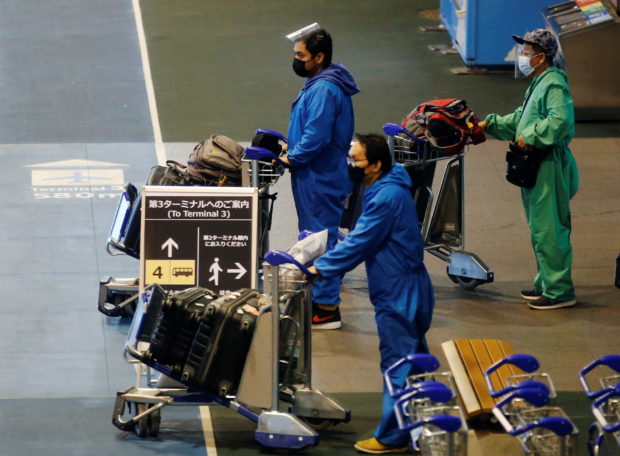Japan set to announce easing of strict border measures

Men wearing protective suits make their way at a bus stop at Narita international airport on the first day of closed borders to prevent the spread of the new coronavirus Omicron variant amid the coronavirus disease (COVID-19) pandemic in Narita, east of Tokyo, Japan, November 30, 2021. REUTERS/Kim Kyung-Hoon
TOKYO — Japan is set to announce on Thursday that it will ease border controls put in place to counter the spread of the coronavirus, measures that are the strictest among wealthy nations and have been slammed by business leaders and educators.
About 150,000 foreign students have been kept out of the country, along with workers desperately needed by an aging nation with a shrinking population, prompting warnings of labor shortages and damage to Japan’s international reputation.
Japan briefly eased its border rules, which have effectively kept the nation closed to non-residents for two years, late in 2021 but tightened them again just weeks later as the Omicron variant emerged overseas.
Among the measures set to be announced will be raising the number of people allowed to enter Japan to 5,000 a day from the current 3,500, according to media reports.
Others are likely to include shortening the required quarantine period, currently a week, to three days under certain circumstances, such as the coronavirus risk level in the nation people travel from and whether they are fully vaccinated, including a booster shot.
Article continues after this advertisementJapan designates 82 nations as “high risk” and requires three or six days of mandatory hotel quarantine as part of the week of isolation for many. Two weeks of quarantine were required until mid-January.
Article continues after this advertisementPrime Minister Fumio Kishida is expected to announce the new measures at a news conference on Thursday. They would take effect in stages from March, media reports say.
Kishida and his government have hailed the tight border controls for buying Japan time as Omicron surged around the world, and a vast majority of the public supports them.
Yet with the variant now widespread in Japan, which is struggling to roll out booster shots, business leaders and some politicians have warned the measures are obsolete.
For Kishida, who faces a crucial election in July, deciding when and how to change the measures has been tricky, said political analyst Atsuo Ito.
“If you look at the overall situation now, they’re meaningless; you can get the virus anywhere. But as a result of having them, he got a lot of public support,” he said.
If they’re not changed, Ito added, “the result over the long term is that Japan is going to be left behind the rest of the world.”